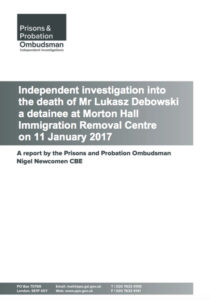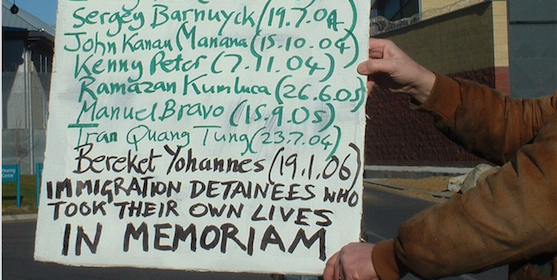 On 11 January 2017, 27-year-old Lukasz Debowski was found hanged in his room at Morton Hall, an immigration detention centre in Lincoln.
On 11 January 2017, 27-year-old Lukasz Debowski was found hanged in his room at Morton Hall, an immigration detention centre in Lincoln.
2017 was the deadliest year in immigration detention, with the largest number of deaths. Lukasz Debowski was the first of six people to die that year, and the fifth person to die at Morton Hall (run by the Prison Service).
A recently published Prisons and Probation Ombudsman (PPO) report into his death makes for chilling reading. Mr Debowski was arrested for deportation and was identified as a suicide risk in police custody. However, the next day, when he arrived at Morton Hall, staff decided he was not a suicide risk.
A person escort record which accompanied him from the police station ‘noted he had previously attempted suicide and had thoughts of killing himself. The person escort record also indicated that he had been released from a psychiatric hospital five months earlier.’ The PPO was:
‘concerned that the nurse did not find out more information about Mr Debowski’s time in a psychiatric hospital and that she does not appear to have used the available information about Mr Debowski’s risk as a tool to assist her assessment of him.
Similarly, the reception officer told us she could not recall seeing information about Mr Debowski’s risk of suicide or self-harm … but neither the officer nor the nurse appear to have addressed or acknowledged any of the concerns recorded in Mr Debowski’s person escort record and suicide and self-harm warning form. Nor, critically, had they recorded what led to their conclusion that he was not in fact at risk of suicide or self harm, despite the clearly documented risks.’
It was also found that new psychoactive substances (NPS) found in Mr Debowski’s body may have played a role in his death.’ Such substances were ‘too prevalent at Morton Hall’.
Mr Debowski was also told he would be deported to Poland ‘as soon as possible.’ He submitted four bail applications to the First Tier Tribunal. But the
‘Home Office opposed Mr Debowski’s stay in the UK because he had been convicted of serious criminal offences in Poland and they considered that it was not in the public interest for him to remain in the UK. The Home Office did not accept that Mr Debowski had demonstrated a genuine and subsisting relationship with his partner. On 1 December, the court refused Mr Debowski’s first bail application. On 7 December, the Home Office told Mr Debowski of their decision to deport him. (Mr Debowski withdrew his other two bail applications but submitted another application, which was scheduled to be heard on 10 January 2017.)’
On 10 January, he attend a bail hearing by video link but it was refused. This was the day before he died.
The report reveals the contempt with which the Home Office frequently treats migrants (and their families). It took nine hours to inform Mr Debowski’s partner, who had just given birth to their first child, that he had died. The PPO found that there was ‘a need for more effective family liaison arrangements in immigration removal centres’ and that it ‘took too long to tell Mr Debowski’s family of his death’. Similar mistakes occurred after the death of Rubel Ahmed at Morton Hall in September 2014. Ahmed’s family made numerous phone calls to the centre after hearing rumours, and had found staff to be neither ‘sensitive or sympathetic’. And on a visit to the centre ‘on 11 September, they said they found staff defensive and unapologetic and this had compounded their sense of desperation and distress.’
The action plan prepared by the Prison Service after Lukasz Debowski’s death indicates that all the recommended actions have already been completed. This always seems to be the case. A death occurs, there are investigations and recommendations and action plans. Then someone else dies. Something must be going wrong if, last year, deaths in immigration detention reached an all-time high.
Related links
Read other PPO reports here
Read the IRR’s list of Deaths in immigration detention: 1989-2017
Read the IRR report on BAME deaths in custody Dying for Justice

